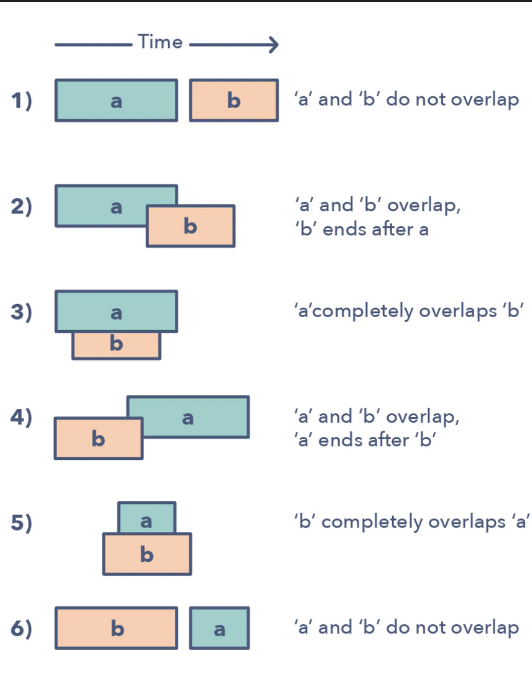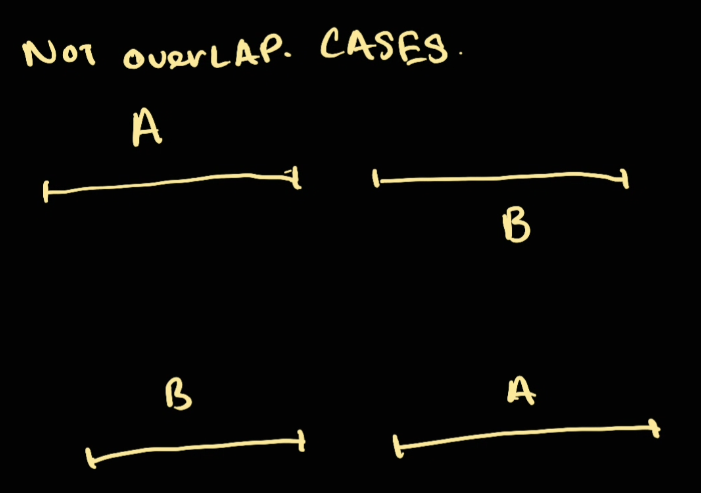Merge Intervals
When dealing with the case of overlapping interval, we have 6 different cases.

Ways to identify
- When the question as you to produce a list with only mutually excusive
- Overlapping intervals
Formula
isOverlap
Two number is overlap if
$$startA \leq endB \quad \textrm{and} \quad startB \leq endA$$
Proof:

First, we need to consider when the 2 ranges will not overlap. They will not overlap if $endA \lt startB$ or $endB \lt startA$.
So they will overlap if the not overlap case doesn't happen.
Therefore
- $!(endA \lt startB \quad || \quad endB \lt startA)$
- Using De Morgan's Laws we have:
- $!(endA \lt startB) \quad \textbf{and} \quad !(endB \lt startA)$
- So we have
- $(endA \geq startB) \quad \text{and} \quad (endB \geq startA)$
Merge
$$mergeInterval = [\min(startA, startB), \max(endA, endB)]$$
- $merge((1,4), (3,5)) = (min(1,3), max(4,5)) = (1,5)$
- $merge((2,9), (3,5)) = (min(2,3), max(9,5)) = (2,9)$
Example
Merge Interval
https://leetcode.com/problems/merge-intervals/solutions/127480/merge-intervals/
Input: intervals = [[1,3],[2,6],[8,10],[15,18]]
Output: [[1,6],[8,10],[15,18]]
Explanation: Since intervals [1,3] and [2,6] overlap, merge them into [1,6].
This question we need to sort first because in the test cases there is 1 case that put [1,10000] in the end. Without sorting we cannot go back and modify our result array
- Time Complexity: $O(nlogn)$ because of sorting
- Space complexity: $O(n)$ as we need a new array to store our result
Intuition
We keep considering if the previous number can be merged with the current number
class App:
def merge(self, intervals: List[List[int]]) -> List[List[int]]:
result = []
if len(intervals) == 0: return result
# Why sort? Because there is a test case that won't work if we don't sort
# We want the list to be sorted from small -> large before doing this
# Else if we're at the end and we have a [1,10000], we can't do it
intervals = sorted(intervals, key=lambda i: i[0])
mergeInterval = None
for interval in intervals:
if not mergeInterval:
mergeInterval = interval
continue
if self.mergable(interval, mergeInterval):
mergeInterval = self._merge(interval, mergeInterval)
else:
# We keep appending the mergeInterval because it's always the last
# element even if we can't do a merge
result.append(mergeInterval)
mergeInterval = interval
if mergeInterval is not None:
result.append(mergeInterval)
return result
def mergable(self, intervalA, intervalB):
"""
proof: https://swe.auspham.dev/docs/algorithms/arrays/merge-intervals/#isoverlap
"""
startA, endA = intervalA
startB, endB = intervalB
return endA >= startB and endB >= startA
def _merge(self, intervalA, intervalB):
startA, endA = intervalA
startB, endB = intervalB
return [min(startA, startB), max(endA, endB)]
Insert Interval
https://leetcode.com/problems/insert-interval/
Input: intervals = [[1,3],[6,9]], newInterval = [2,5]
Output: [[1,5],[6,9]]
This question we don't need to sort because the condition give us the intervals array sorted and non-overlapped.
- In real interview, make sure to clarify this limitation carefully to avoid over-thinking
- If the interviewer say this could be overlapped, we then insert the
newIntervalinside theintervalsarray and perform a sort. Therefore comes back to the Merge Interval problem
Intuition
For this question, we don't consider merging with the last element. This is because since the array is non-overlapped, merging only happens once from the moment we use newInterval.
Therfore, we only insert the mergeInterval once in the correct position.
class App:
def insert(self, intervals: List[List[int]], newInterval: List[int]) -> List[List[int]]:
if len(newInterval) == 0: raise Exception("Invalid Arguments")
result = []
mergeInterval = newInterval
for interval in intervals:
if mergeInterval and self.mergable(interval, mergeInterval):
mergeInterval = self.merge(interval, mergeInterval)
else:
# add mergeInterval in if the current interval > mergeInterval
if mergeInterval and interval[0] > mergeInterval[1]:
result.append(mergeInterval)
mergeInterval = None
result.append(interval)
if mergeInterval is not None:
result.append(mergeInterval)
mergeInterval = None
return result
def merge(self, intervalA, intervalB):
startA, endA = intervalA
startB, endB = intervalB
return [min(startA, startB), max(endA, endB)]
def mergable(self, intervalA, intervalB):
startA, endA = intervalA
startB, endB = intervalB
# Proof: https://swe.auspham.dev/docs/algorithms/arrays/merge-intervals/
return startA <= endB and startB <= endA